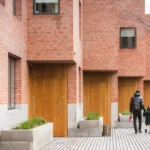Key Points
- Newham Council is proposing to remove the exemption for construction vehicles from ‘Healthy School Streets’ (HSS) restrictions.
- The proposal amends the existing Traffic Management Order (TMO), which previously allowed construction vehicles access during restricted periods.
- The move is designed to improve road safety, reduce air pollution and protect children during school drop-off and pick-up times.
- If approved, the council would assess requests for construction vehicle access on a case-by-case basis rather than granting a blanket exemption.
- Concerns over the abuse of exemptions led Newham’s Head of Transport Policies and Programmes to support this change.
- Resident and business access, blue badge holders, and emergency services will still enjoy exemptions under the HSS scheme.
- The policy change is part of a wider movement, with similar schemes implemented in other London boroughs like Camden.
- Experimental Traffic Orders (ETOs) will be used to trial new restrictions, enabling statutory consultation and review after six months.
- Impact assessments found potential positive outcomes, including improved safety and air quality for school children.
- The proposal is currently subject to consultation and can be challenged through the council’s official processes.
Construction vehicles’ exemption from Newham Council’s ‘Healthy School Streets’ road restrictions may soon be eliminated as part of a broad new initiative aimed at improving child safety and air quality outside local schools. In proposals revealed by Newham Council, the authority intends to update its Traffic Management Order (TMO), thereby removing the current exemption for construction and building vehicles which has, until now, allowed them unrestricted access during school run hours.
- Key Points
- What is the healthy school streets scheme and how does it work in Newham?
- Why is Newham Council proposing to remove the exemption for construction vehicles?
- What changes will the proposed policy bring to vehicle access?
- How are the proposals being implemented and monitored?
- What is the expected impact of the new restrictions on local safety and air quality?
- How do Newham’s policies compare to other boroughs with similar schemes?
- What are the arguments for and against the proposed removal of the construction vehicle exemption?
- What happens next? How can residents and stakeholders have their say?
What is the healthy school streets scheme and how does it work in Newham?
As explained by Newham Council’s own published material, the Healthy School Streets scheme is a road safety initiative that imposes timed road closures outside school entrances, restricting access for most types of motor vehicles at the start and end of the school day. The goal is to promote safer, less polluted environments for children and families by reducing traffic volume, discouraging car journeys, and encouraging more walking and cycling.
The operative hours for these restrictions typically align with the morning drop-off and afternoon pick-up periods—usually lasting for around one hour each. Clear signage is displayed at all affected entrances, and automatic number plate recognition (ANPR) cameras help enforce compliance. Vehicles violating these restrictions are issued Penalty Charge Notices (PCNs).
Why is Newham Council proposing to remove the exemption for construction vehicles?
According to a detailed report by Open Council Network, Newham Council’s Officer Key Decision was motivated by concerns that the construction vehicle exemption was being exploited. Previously, vehicles used for building operations—including works on sewers, utility lines, or demolition—were granted access to HSS zones even during the most sensitive traffic control periods.
The Head of Transport Policies and Programmes raised the issue that the breadth of the exemption allowed for unregulated building activity, regardless of its necessity or timing, undermining the protective goals of the scheme. The council now believes that a more discretionary, case-by-case approach would guard against inappropriate use, ensuring that exemptions are provided only where absolutely necessary and with due regard to pupil safety.
What changes will the proposed policy bring to vehicle access?
If the amendment is adopted, construction vehicle access would no longer be automatic. Any requests for access during restricted times would need to be justified and approved by the council individually. This aligns HSS exemptions with current policies for residents, blue badge holders, and essential services, as clarified on the council’s website and in related boroughs’ approaches.
Residents and businesses within restriction zones, Blue Badge holders, emergency services, and refuse collection vehicles will continue to be eligible for exemptions, either automatically or through application, to ensure that essential movements are not impeded unduly.
How are the proposals being implemented and monitored?
As highlighted in official council communiqués and guidance, Newham is using Experimental Traffic Orders (ETOs) to implement changes. ETOs are legal devices employed to introduce access restrictions for up to 18 months as a trial. The first six months of an ETO function as a statutory public consultation period, after which the scheme can be confirmed, adjusted, or revoked based on community feedback.
Signage will be updated, ANPR cameras adjusted, and council staff will monitor vehicle movement and compliance meticulously throughout the trial. Residents, parents, and stakeholders are being urged to contribute their views throughout this consultation window.
What is the expected impact of the new restrictions on local safety and air quality?
In a statement attributed to Newham Council and reported by Asian Standard, proponents of the policy argue that removing the construction vehicles’ exemption is expected to reduce inappropriate traffic volumes, lower air pollution, and bolster the safety of streets surrounding schools.
The council’s own impact assessments detail improvements seen in prior implementations of Healthy School Streets: local NO2 emissions on participating roads have dropped by 7.5%, and driver behaviour around schools has become noticeably safer. These findings are in line with experiences reported in other boroughs like Camden, where independent consultation and monitoring confirmed that timed road closures outside schools reduce danger and encourage more children to walk or cycle to class.
How do Newham’s policies compare to other boroughs with similar schemes?
Camden Council, for example, has implemented permanent Healthy School Streets schemes after successful trial periods. There, construction, delivery, and taxi vehicles are not automatically exempt. Any requested exemptions—for example, special construction works—are reviewed by the council and granted only when absolutely necessary and with conditions to limit disruption.
Other boroughs also use ETOs for trials, maintain strong community consultation throughout, and recommend similar zones and exemption processes, demonstrating a citywide move toward more restrictive, child-centric school street environments.
What are the arguments for and against the proposed removal of the construction vehicle exemption?
In support, Newham Council, as summarised by Open Council Network, contends the change will help keep school roads free from unnecessary and potentially hazardous traffic, especially during the riskiest periods, and ensure the policy’s original aims are realised. The council stresses that each request for access will be reviewed on its own merits, supporting both essential development works and student wellbeing.
Concerns have been raised, especially from those in the construction sector and related industries, about delays and complications the new process could bring. These stakeholders argue that day-to-day construction and maintenance require timely, sometimes urgent access to restricted zones. The council’s policy pledges to be responsive to such cases, but emphasises safety as paramount.
What happens next? How can residents and stakeholders have their say?
The proposal is subject to public consultation as per the ETO process. Members of the public, parents, businesses, and local construction professionals are invited to comment during the statutory consultation window. After this period, the council will review the feedback, assess the trial, and determine whether to solidify, adjust, or discontinue the new rules.
Statements, data, and guidance have been regularly published on the Newham Council website and via Open Council Network. Stakeholders are encouraged to remain engaged through official communication channels, including council meetings, online platforms, and dedicated school engagement sessions.



